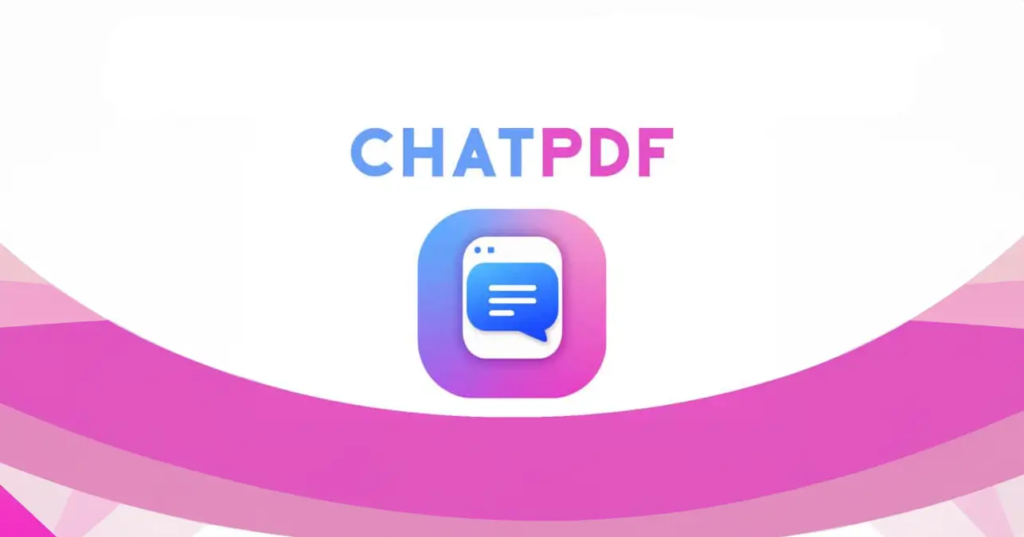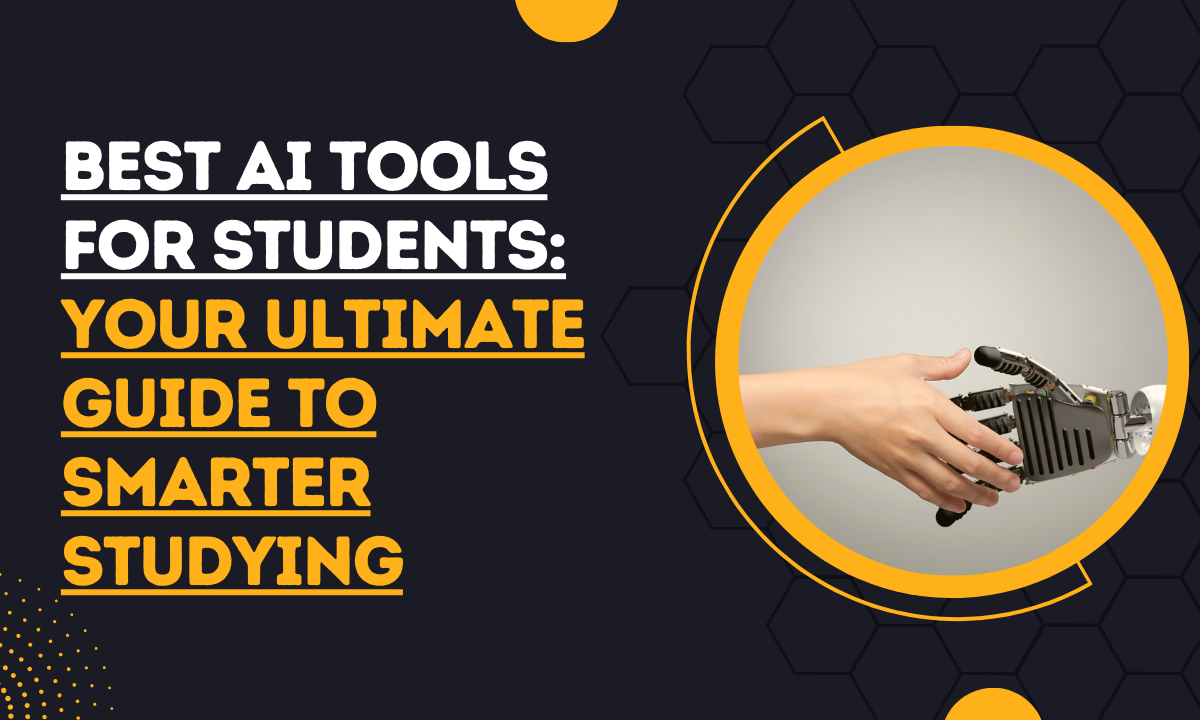Best AI Tools for Students: Your Ultimate Guide to Smarter Studying
The best AI tools for students are no longer futuristic luxuries. They’re everyday study companions that can help you write sharper essays, digest research faster, or even create resumes that land interviews.
Think of them as invisible assistants working quietly in the background — boosting your productivity, sharpening your skills, and giving you more time to focus on what really matters.
But here’s the key question: which ones are worth your attention?
The sheer number of AI apps can overwhelm anyone. Some overpromise, some underdeliver.
That’s why I’ve narrowed this list to 11 tried-and-tested tools that cover writing, research, learning, accessibility, and even career preparation.
Each one has a unique role in helping you study smarter, not harder.
Let’s dive in.
Best AI Tools for Students
| AI Tool | Use Case for Students |
|---|---|
| ChatGPT | All-in-one study companion for brainstorming, writing, explanations, and problem-solving. |
| Quillbot | Paraphrasing made simple to rewrite essays and improve clarity. |
| Grammarly | Polishes essays by correcting grammar, tone, and style. |
| Google Gemini | Smarter search engine for research, analysis, and understanding complex topics. |
| ChatPDF | Lets students chat with PDFs to summarize and extract insights. |
| Doctrina AI | Creates instant notes, quizzes, and study aids on any subject. |
| Tutor AI | Provides personalized tutoring and answers to academic queries. |
| Natural Readers | Converts text into natural-sounding voice for accessibility and learning. |
| Mubert | Generates background music for focus, studying, or relaxation. |
| Kickresume | Builds professional resumes and cover letters tailored to careers. |
| AskCodi | Simplifies coding by generating snippets, explanations, and solutions. |
AI for Writing and Creativity
ChatGPT — Your All-in-One Study Companion

When conversations around the best AI tools for students happen, ChatGPT usually leads the pack.
Why? Because it’s incredibly versatile.
You can brainstorm essay ideas, draft outlines, or even simulate Q&A sessions for exam prep. Some students use it to refine their arguments; others rely on it for coding explanations.
Its free version already offers unlimited access, which is rare among AI tools.
The real strength of ChatGPT lies in how it mimics human interaction.
Need to understand a tough physics concept?
Ask it to explain as if you’re five.
Writing an essay?
It can help generate structure and sources.
The catch? You need to guide it well.
Clear prompts and good prompt engineering means better answers. Think of it less as a magic wand and more as a sharp tool — powerful, but dependent on how you use it.
Quillbot — Paraphrasing Made Simple
Have you ever struggled to rephrase a sentence without losing its meaning?
Quillbot solves that problem elegantly. Among the best AI tools for students, this one shines for paraphrasing and summarizing.
The free version allows you to rewrite up to 125 words at a time, which is usually enough for short paragraphs or note condensing.
Students lean on Quillbot when working on research papers, essays, or even thesis drafts. It offers multiple rewriting modes — from standard to fluency-focused.
This ensures that your output isn’t just grammatically correct, but also natural-sounding.
Is it perfect?
Not always. Sometimes it oversimplifies.
But if you’re looking for a tool that saves hours of rewording while staying plagiarism-safe, Quillbot deserves a spot in your toolkit.
Grammarly — Writing Polished Essays
Good writing is more than correct spelling. Grammarly goes deeper, checking tone, clarity, and engagement.
That’s why it’s consistently ranked among the best AI tools for students.
The free version is generous, covering 300 documents or 150,000 words per month — plenty for most college assignments.
What makes Grammarly stand out is its ability to act like a digital editor.
It flags overly complex sentences, suggests stronger word choices, and even helps adjust tone depending on whether you want your essay to sound formal or conversational.
For international students or anyone struggling with English grammar, Grammarly is almost indispensable.
And unlike traditional spellcheckers, it adapts to context — an underrated but game-changing feature.
AI for Research and Understanding
Google Gemini — Smarter Search for Students
We all know the frustration of drowning in search results. That’s where Google Gemini changes the game. It’s not just a search engine — it’s an AI-driven research assistant.
For students, this makes it one of the best AI tools for students who need fast, accurate insights. The free version gives you unlimited access, so you can explore without restrictions.
Here’s the beauty: Gemini doesn’t just throw links at you. It summarizes, compares, and highlights the most relevant parts of your query.
Preparing a paper on climate change?
Instead of reading ten dense PDFs, you can get a synthesized overview in minutes.
This doesn’t mean you skip critical reading, but it dramatically reduces the grunt work of filtering noise from signal.
ChatPDF — Conversational PDFs

Source: Intelarter
Academic life often revolves around PDFs — journal articles, research reports, lecture notes.
ChatPDF lets you upload them and ask questions directly, like chatting with the document.
Imagine saving hours by asking, “What are the key findings in section three?” instead of reading 40 pages.
No wonder it ranks among the best AI tools for students.
The free version allows three PDF uploads and 50 questions a day, which is more than enough for weekly coursework.
It’s especially useful for students working on dissertations, where documents can run into hundreds of pages.
Does it replace close reading?
Of course not.
But it acts like a spotlight, helping you focus on what truly matters. Think of it as having a research assistant whispering summaries in your ear.
AI for Learning and Tutoring
Doctrina AI — Notes and Quizzes On Demand

Source: OpenAI Master
Studying can feel endless when you’re preparing notes manually. Doctrina AI simplifies this by generating concise notes and quizzes on any topic.
Among the best AI tools for students, this one stands out for personalized learning. You enter a subject, and it delivers bite-sized content perfect for revision.
For example, if you’re tackling organic chemistry, it can produce a quiz set tailored to that chapter.
This approach not only saves time but also sharpens retention.
Students often underestimate the power of self-testing, but research shows that active recall significantly boosts memory.
Doctrina makes this recall process effortless. With its free access to notes and quizzes, it’s a handy companion for midterms and finals.
Tutor AI — Personalized Tutoring Anytime
What if you had a tutor available 24/7? That’s what Tutor AI offers.
It creates course-style explanations and quizzes based on your queries.
The free plan includes three queries per month, which might sound limited, but it’s enough for testing its potential.
The real value of Tutor AI is in how it tailors learning.
Unlike generic study guides, it adapts to your pace and level. Struggling with calculus? It breaks down concepts step by step.
Preparing for a history test?
It generates timelines and summaries. In the larger ecosystem of the best AI tools for students, Tutor AI is like a personal coach — not flashy, but deeply effective when used wisely.
AI for Accessibility and Expression
Natural Readers — From Text to Voice
Accessibility is often overlooked in education, but it’s crucial. Natural Readers addresses this gap by converting text into speech.
For visually impaired students, or simply those who prefer auditory learning, it’s among the best AI tools for students today.
The free version offers 4,000 characters per day, enough for chapters or articles.
Why does this matter?
Because learning styles differ.
Some students absorb better through listening.
Others use it while commuting or exercising, turning dead time into productive hours.
Natural Readers also helps in proofreading essays — hearing your words aloud makes it easier to catch errors your eyes skip over.
It’s not just an accessibility tool; it’s a productivity enhancer.
Mubert — Music for Focus and Relaxation

Source: Music In Africa
Ever noticed how music changes your concentration levels? Mubert takes this further by creating AI-generated music from text prompts.
For students juggling long study hours, it belongs on the list of best AI tools for students. The free version lets you create up to 25 tracks a month.
The value here isn’t just novelty.
Science shows that background music can improve focus and reduce anxiety.
With Mubert, you can design playlists that match your mood or task — calm for reading, upbeat for problem-solving.
Unlike generic playlists, these tracks are uniquely generated for you, reducing the chance of distraction. It’s a small tool with surprisingly large benefits for mental stamina.
AI for Career and Future Skills
Kickresume — Building a Professional Resume
Education is one part of student life; preparing for the future is another.
Kickresume helps you design professional resumes without spending hours formatting. It’s among the best AI tools for students transitioning to internships or jobs.
The free version doesn’t allow downloads, but you can still experiment with layouts and content.
What makes it valuable is how it integrates AI to suggest improvements.
Struggling with wording? It offers bullet-point examples.
Unsure about design?
It provides templates tailored for industries.
For students unfamiliar with professional standards, Kickresume acts as both a designer and a mentor, making sure your first impression isn’t your last.
AskCodi — Coding Made Easier
Coding has become a universal skill, regardless of your major. AskCodi simplifies this by providing instant code suggestions and explanations.
For budding developers, it ranks high among the best AI tools for students.
The free version includes 50 credits per month, which is enough for small projects or debugging sessions.
Unlike generic coding platforms, AskCodi is interactive. You can ask “Why isn’t my loop working?” and get context-based feedback.
This accelerates learning by reducing frustration. In a world where coding fluency often translates to career opportunities, AskCodi doesn’t just help you finish assignments — it sharpens your long-term skills.
FAQs
How can AI help students improve their writing skills?
AI-powered writing assistants can refine grammar, adjust tone, suggest synonyms, and even paraphrase complex sentences. This ensures essays, assignments, and research papers look polished and professional. Instead of replacing creativity, these tools act like a supportive editor—helping students communicate ideas clearly, avoid repetitive errors, and build confidence in academic writing.
Can AI simplify complex research materials for learners?
Yes. AI can quickly summarize long articles, extract key insights from research papers, and highlight important sections in PDFs. This saves hours of manual reading and helps students grasp complex material faster. By turning dense information into digestible summaries, AI allows learners to focus more on analysis and application rather than just decoding texts.
Is AI useful for personalized learning and tutoring?
Absolutely. AI-based tutors provide tailored explanations, instant feedback, and customized quizzes that adapt to the learner’s pace. This one-on-one learning support ensures that students can revisit concepts until they fully understand them. Unlike traditional tutoring, AI is available anytime, making it an on-demand academic companion that adapts to individual needs.
How can AI support accessibility in education?
AI enhances accessibility by converting written text into natural-sounding speech, helping students who prefer audio learning or face reading difficulties. It also enables multitasking—learners can listen to notes while commuting or exercising. Additionally, AI can create background music for focus, making study sessions more engaging and productive for different learning preferences.
Can AI assist in preparing for future careers?
Yes. AI helps students build professional resumes, draft cover letters, and even practice technical skills like coding. By offering templates, guidance, and real-time feedback, it prepares students for job applications and interviews. Beyond academics, AI bridges the gap between learning and career readiness, ensuring students gain practical skills valued in today’s job market.
Will using AI make students dependent instead of independent?
Not if used wisely. AI should be treated as a support system rather than a crutch. It can save time on repetitive tasks, provide guidance, and boost efficiency, but students must still apply critical thinking, originality, and personal effort. When balanced correctly, AI enhances independence by giving learners more time to focus on creativity and problem-solving.
Related Posts
AI in Higher Education: 2025 Trends & Challenges
AI is reshaping teaching, learning, and assessment in universities. But with growth come challenges of ethics, equity, and academic integrity.
Course: AI for Everyone – Non-Techies, Time’s Running Out!
This beginner-friendly program helps non-techies master AI basics. Seats are filling fast—don’t miss your chance to stay relevant.
13+ Free AI Courses Every Non-Techie Must Grab Today
Access top-quality AI education without spending a dime. These free courses make learning practical, accessible, and career-boosting.
AI Plagiarism Is Ruining Higher Education: Fix It Before Disaster!
AI-generated essays are testing academic honesty worldwide. Stronger safeguards are needed before trust in higher education collapses.
Conclusion
From writing and research to learning and career prep, the best AI tools for students cover every angle of academic life.
They automate repetitive tasks, personalize your study journey, and even make learning more accessible and engaging.
Whether you’re drafting essays with ChatGPT, generating study notes with Doctrina AI, or preparing resumes with Kickresume, these tools help you save time and focus on real growth.
So, what’s the next step? Try them out.
Experiment with free versions, see what fits your style, and build your own stack of AI companions. The smartest students aren’t the ones who study the longest — they’re the ones who study the smartest.
And with these tools, you’ll be well on your way.

